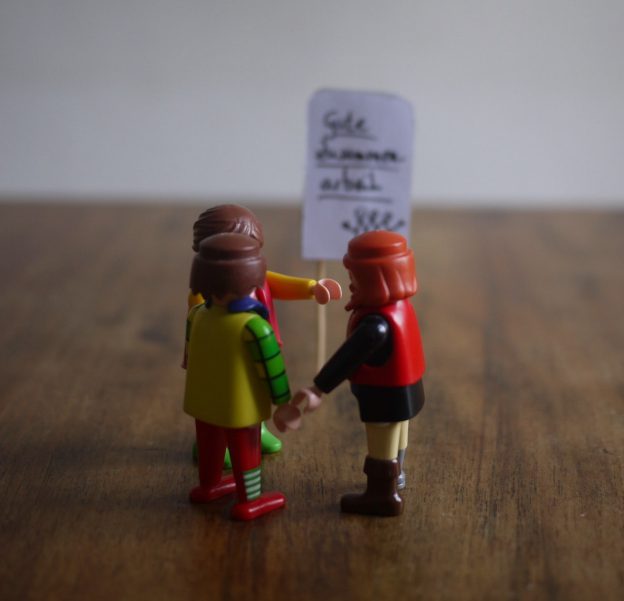
In #grumo_07 (When interests conflict), #grumo_06 (What if I’m afraid of the group?) and #grumo_05 (Storming to good performance), our experts have already dealt with conflicts in the group and also with the necessary, albeit sometimes stormy, formation of opinions. Today they talk about what trainers can do when they simply don’t like the group or individuals in it – and that can actually happen.
Paul straightens the camera: „Do you see me better now?“ Once again the group meets online. Paul hasn’t even come back from his holiday home in the Waldviertel, he can work online from there. He has just shown the others the garden covered in deep snow and is now trying to turn the camera back on himself. They chat briefly about what has happened since the holidays, then Maria introduces the topic.
Was everything better in the past?
„I took time over the holidays to clean out my cellar and in the process I started browsing through old seminar notes. I used to take notes at my seminars almost like a diary,“ she explains. In the process, she noticed that she had repeatedly encountered groups that she simply didn’t like. „In my memory, all my seminars were always great, but apparently I often experienced things differently during them.“ Rudi hooks in briefly and explains that this is a fairly well-known neurological phenomenon: the brain stores positive experiences in a more available way, negative ones tend to be buried. „That’s why we often have the impression: everything was better in the past!“ he smiles, „most of the time that’s not true at all.“
Grumbling helps, if it’s honest
Yasemine turns on her microphone and speaks up. She, too, has made the experience that there are always events where she reacts particularly to individual participants. As a professional, she naturally tries not to let this flow into the seminar, but it has done a lot of good to rant about the „stupid group“ with the co-trainer afterwards. First of all, it helps to vent the emotion, and secondly, it often helps them to find out what exactly bothers them so much. For example, because the training partner had a different view of things. „If you honestly search for what it is exactly that triggers you, it’s a bit like self-awareness, except that you get paid for it,“ Yasemine laughs. Beate looks a bit sceptical: „I don’t think it should be a cheap excuse. If every group is always stupid, then there’s something wrong with your own attitude.“ Yasmine nods vigorously. „Of course. Then clearly the question is who is the one driving against the one-way-drive.“
Group phases: (prevented) storming
Paul brings up the group phases again and says that it depends on what the group is doing at the moment. A group in the middle of storming can sometimes seem quite unlikeable, because when it’s time to agree on something, the sparks fly again and again. But afterwards you suddenly find them completely okay again and even agreeable. Maria looks thoughtful and says: „I think I find groups exhausting that try to prevent storming with all their might. Where everyone is constantly a bully or doesn’t say anything at all and withdraws to an observer position. It’s like wading through waist-deep water – I often get a bit impatient…“ The others nod. „Your impatience is probably also a reflection of how others in the group are feeling. They probably find the bullies and observers just as tedious. Sometimes it’s good to talk about that and put yourself in the role of a representative,“ says Yasmine.
Trainers are only human
Rudi raises his hand and after a short pause says: „I think it’s quite normal that we like some participants and not others. If a group is largely made up of people we don’t like, then we quickly „don’t like“ the whole group. Plus: there are certainly group cultures that make us „fidgety“. For example, I get rashes when people start wiggling their hands to express agreement, others find it a very pleasant way to position themselves in the plenary. I think sometimes we mustn’t be so hard on ourselves, we are only human beings who try to keep a professional frame but are not free from our own emotions.“ Yasmine wiggles her hands and grins mischievously, Rudi rolls his eyes and laughs out loud. „I knew you’d have to do that right now!“
Rudi’s words and Yasmine’s idea of seeing anger as an opportunity for self-awareness bring the topic to a rounded conclusion for everyone. Referring to the experience with „annoying“ groups and participants, our experts agree to coach each other more often in constellations of 2 or 3 in order to better recognise their own patterns and trigger points. At the end, Beate expresses the request to talk about the possibilities of teambuilding in an online format at the next meeting, because she would like to have input for an upcoming assignment. The corresponding wealth of experience is distributed differently in the group – all the more reason to comply with the request and ensure know-how transfer!
Authors: Gerda Kolb and Irene Zavarsky
Translation: Astrid Donaubauer
Want more? You can find all the articles in the series HERE!

Dieses Werk ist lizenziert unter einer Creative Commons Namensnennung-NichtKommerziell-Weitergabe unter gleichen Bedingungen unter gleichen Bedingungen 3.0 Österreich Lizenz.
Volltext der Lizenz



